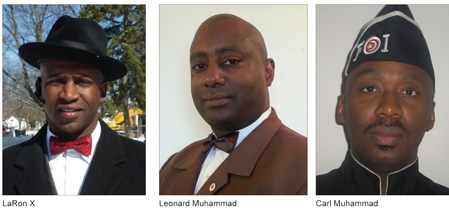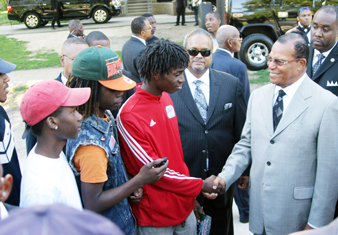Stories of new lives after leaving gangs, street life and joining the Nation of Islam
By Starla Muhammad -Staff Writer- | Last updated: Mar 24, 2013 - 1:13:25 PMWhat's your opinion on this article?
There is a better way -Part 1

|
“The Muslims have shown a tremendous ability to reform those of our people who break the law.” – Minister Louis Farrakhan
(FinalCall.com) - LaRon was a self-described “hustler.” Born and raised in Flint, Michigan, he was introduced to the fast life of the streets, drug selling and ultimately, landed in prison. Today, he is Brother LaRon X, a carpenter by trade.
Carl and Leonard grew up in Chicago and Milwaukee respectively.
As teens, both joined gangs, traveled the wrong path also landing behind bars.
Now, Brother Carl Muhammad and Brother Leonard Muhammad are responsible, hard working family men.
The common denominator that sparked the desire in these men to change the course of their lives was their introduction to the Teachings of the Honorable Elijah Muhammad and joining the Nation of Islam.
With an over 80-year history of influencing a change in the hearts and actions of men and women once considered criminals, the Nation of Islam has a proven track record of changing people.
While the road to redemption and rehabilitation is not without its challenges and bumps along the way, LaRon, Carl and Leonard are not the men they once were.
They hope their decisions to lead a different life can serve as a lesson to young brothers who continue to be caught up in the drug game and gang culture.

Minister Farrakhan speaks with young men in Chicago.
“The biggest thing that the teachings did for me is it helped me to look at myself and be honest with myself and ask myself: Is this the legacy that I want to leave?” —LaRon X |
Hard lessons of street life
“You know I never had no intentions on becoming a hustler but it kind of suddenly took root,” says LaRon whose uncle used to snort cocaine in front of him when he was nine.
He told himself he would never be a drug dealer.
“But, I ended up becoming what I despised,” says LaRon. At 13, he says he began selling pills and though he found success playing sports, the lure of the streets took hold.
“I started selling drugs and once you make a little money, the drug dealer becomes an addict too. It’s not just the user that becomes the addict but the person that’s actually selling to the user, they become an addict. It just kept growing and growing and I guess I got too big for my britches,” he says. The result, was serving a nearly 12 year prison sentence on drug charges.
As a boy, Leonard says he would visit Chicago from his home in Milwaukee to visit family and was introduced to the streets at age 12 when he would hang out with his uncle.
“I used to come up to Chicago in the summer time and stay with my grandmother and go different places with my uncle and that’s pretty much how I started getting introduced into the street organization and that particular lifestyle, by being around a lot of those brothers,” says Leonard. He recalls being the “lookout” while his uncle and uncle’s friends would shoot dice.
Leonard says even visiting his uncle behind prison bars and meeting high ranking members of street organizations like Larry Hoover, of the Gangster Disciples, did not deter him from a life of crime. The lure of selling drugs and making money became his life.
“At first, I was just doing it really to just pass the time because I knew this was not really what I want to do, but I don’t know what I want to do so until I figure it out, I’m gone do this. That way I’m keeping money in my pocket and I don’t have to ask nobody for nothing,” says Leonard. It was the only life he knew.
He was subsequently indicted along with others on drug charges and at 19, was sent to federal prison and ultimately served over 14 years.
Carl was born and raised in Chicago and he, too, was introduced to gang life at a young age. The youngest of seven, he began getting into trouble with the law and ended up in and out of juvenile facilities. The attraction to gangs when he was around 12 or 13 was the search for brotherhood, he explains.
Like so many Black men and boys that engage in a life of crime, Carl also ended up in the penitentiary.
New life, new struggles, new changes
The road to change for LaRon was not an easy one. He says his introduction to Mr. Muhammad’s teachings was in the early 1990s by way of a friend who was born and raised in the Nation of Islam.
“He kept saying, ‘Man this is you (Islam), this is your character.’ I would make a joke. I’d say, no that’s you. He was like no, it’s for you; it just fits you,” says LaRon. When his friend convinced him to come to a mosque meeting, LaRon tried to avoid going.
“He came and I tried to dodge him. I didn’t want to go and I tried to tell my mother, ‘Tell him I’m not here.’ My mother said, ‘I ain’t lying for you, you’re going to go,’ ” he says.
When he heard the message LaRon says he knew it was for him but once again, the call of the streets was powerful. It was while incarcerated that the reality of the teachings took root, he explains.
Leonard says he knew very little about the Nation of Islam but began learning more as he met other brothers serving time who were students or strongly influenced by the teachings.
“As I’m listening, I had already made up my mind that I’m coming to this service every week because I wanted to know more because I liked how they were talking about Black unity, us carrying ourselves with self-respect, taking care of our families and being men and not little boys masquerading as men,” says Leonard.
“The biggest thing that the teachings did for me is it helped me to look at myself and be honest with myself and ask myself: Is this the legacy that I want to leave? You know somebody running around here, gang bangin’, killing your own people, poisoning your own people and just running around with no responsibilities … taking life as a joke,” he adds.
Carl says he was walking past a room one day in prison where brothers were meeting and “something” pulled him in.
“They were having a study circle from the Study Guides but they gave me a tape. They sat me down at a table with a tape of the Minister and also gave me How To Eat To Live,” says Carl. At the time, he was heavy into body-building so the subject matter of health and nutrition appealed to him.
He eventually met Brother Leonard and began studying in more detail. Carl says he learned to treat one time rivals as brothers. Upon his release in 1999, he went to a local Nation of Islam mosque and joined.
A more developed consciousness and love of Black people, Carl never had while running the streets, was pricked.
“I use the teachings for the standard of what a man is,” says Carl, a husband and father.
Reaching a new generation
Minister Louis Farrakhan, National Representative of the Hon. Elijah Muhammad, says America has not found a way to curb crime and reform those in her society who consistently break her laws, particularly in the Black community. He has consistently spoken at prisons and jails throughout the U.S. and most recently to inmates at Belize Central Prison telling them once they know “who” and “whose” they are, they will begin to act accordingly.
“The whole world is waiting for you to rise up and be yourself,” the Nation of Islam Minister told male and female inmates in his March 7 address.
While society is quick to write off young, Black men who are “gang bangers,” the redemptive teachings of the Honorable Elijah Muhammad have proven effective for thousands of men and women who have languished in America’s prison industrial complex. LaRon, Leonard and Carl are prime examples of what a desire and commitment to change can manifest. All three are committed to reaching out to this generation’s Black youth.
Leonard, who calls Chicago home, is now a successful truck driver and still talks to young brothers out on the streets. He has spoken to others still locked down behind bars, letting them know that there is a better way to govern their lives.
Carl says anytime he engages youth he is honest and straightforward in his approach.
“If I can deal with them one on one because they have a lot of personal issues they are dealing with, and I have known others to have dealt with it, if I haven’t dealt with them myself. I try to get into areas where people are afraid to talk to them about or talk with them, not talk to them because it’s penned up, and they really want to let it out to relieve stress,” he says.
LaRon talks to young people when he can, not just about what not to do, but he tries to give real life advice they can use, based on what he has learned in the Nation. He tells of a time he overheard a group of young men talking about something illegal they had done. Rather than ignoring or condemning, he talked to them.
“They want to be warriors but they just don’t know how to be warriors. It’s the same thing. I wanted to be a warrior but I didn’t know how and when I heard Farrakhan, I mean it was over. I was like, man, no longer can I be an enemy to my people,” says LaRon.
INSIDE STORIES AND REVIEWS
-
-
About Harriett ... and the Negro Hollywood Road Show
By Rabiah Muhammad, Guest Columnist » Full Story -
Skepticism greets Jay-Z, NFL talk of inspiring change
By Bryan 18X Crawford and Richard B. Muhammad The Final Call Newspaper @TheFinalCall » Full Story -
The painful problem of Black girls and suicide
By Charlene Muhammad -National Correspondent- » Full Story -
Exploitation of Innocence - Report: Perceptions, policies hurting Black girls
By Charlene Muhammad -National Correspondent- » Full Story -
Big Ballin: Big ideas fuel a father’s Big Baller Brand and brash business sense
By Bryan Crawford -Contributing Writer- » Full Story






 Click Here Stay Connected!
Click Here Stay Connected!








